Music from Congo-Kinshasa, featuring Le Grand Kallé.
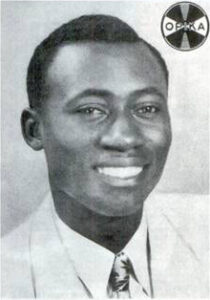 The singer, bandleader, and songwriter Joseph Athanase Tshamala Kabaselé is born on December 16, 1930 in Matadi, the seaport of Congo, at the mouth of the Congo River. His parents are important figures in the Catholic Church there. When he is one week old, the family moves to Kinshasa. He attends the best Catholic schools and sings in church choirs. He was actually supposed to become a priest, like his uncle, Joseph-Albert Malula, who was the Archbishop of Léopoldville and later elected a cardinal under Pope Paul VI. But he prefers popular music over liturgical music. Because he skips school too often to visit music studios, he is expelled. He gets a job as a stenographer, but after work he can always be found at the Opika studio, where the staff calls him Kallé, a contraction of his first name Kabaselé. At the age of 19, he records his first music at the Opika studio, which is owned by the brothers Gabriel Moussa and Joseph Benetar, from the Greek island of Rhodes. (“Opika” means “to take a position”.)
The singer, bandleader, and songwriter Joseph Athanase Tshamala Kabaselé is born on December 16, 1930 in Matadi, the seaport of Congo, at the mouth of the Congo River. His parents are important figures in the Catholic Church there. When he is one week old, the family moves to Kinshasa. He attends the best Catholic schools and sings in church choirs. He was actually supposed to become a priest, like his uncle, Joseph-Albert Malula, who was the Archbishop of Léopoldville and later elected a cardinal under Pope Paul VI. But he prefers popular music over liturgical music. Because he skips school too often to visit music studios, he is expelled. He gets a job as a stenographer, but after work he can always be found at the Opika studio, where the staff calls him Kallé, a contraction of his first name Kabaselé. At the age of 19, he records his first music at the Opika studio, which is owned by the brothers Gabriel Moussa and Joseph Benetar, from the Greek island of Rhodes. (“Opika” means “to take a position”.)
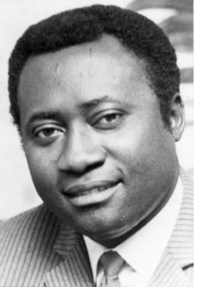
At that time, Cuban music is incredibly popular in Kinshasa and Brazzaville. Therefore, they mostly play in this style, with lyrics in Lingala, and mixed with African rhythms. They call their music style “rumba”, although the form was closer to the Cuban “son”.
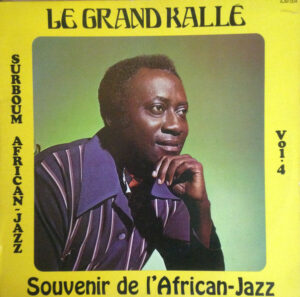
In 1954, Kabaselé and his fellow band members release a song called “African Jazz.” From that moment on, the band is known as “Orchestre African Jazz.” Over the next 10 years, many famous musicians play with African Jazz: guitarists Tino Baroza and Nicolas Kasanda, better known as Docteur Nico, clarinetist Jean-Serge Essous, saxophonist Manu Dibango, and singers Tabu Rochereau, Kwamy Munsi, Sam Mangwana, and Pépé Kallé.
In 1957, the Opika studio ceases to exist when its Greek owners return to their own country. The studio is sold to another Greek, Dino Antonopoulos, who changes the name to Studio Esengo, which means “pleasure.” African Jazz then begins recording music in this studio. But the Rock-a-Manbo orchestra from Brazzaville also records music at the Esengo studio. Both orchestras often share their musicians.
The first song recorded in this studio is “Baila” (= “Dance”) in 1957. The two leaders of the Rock-a-Manbo orchestra also play on this song: Nino Malapet on saxophone and Jean-Serge Essous on clarinet. The latter also composed “Baila” and played clarinet on “Tembe Nye” (= “No Doubt”), which was released in 1958.
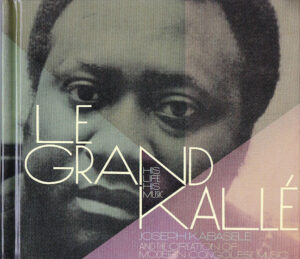
The song “Baila” is also the first Congolese recording with an electric guitar, as up until then Congolese musicians played on acoustic guitars with attached microphones. In “Baila”, Tino Baroza plays the electric guitar, but in “Mokonzi Ya Mboka” (= “Head of the Village”), it is Docteur Nico Kassanda who plays the guitar and composed this piece, a mazurka in 6/8 time.
In “Mama Ngai Habanera” (= “My mother comes from Havana”) and “Nabongisa Kala” (= “I have already fixed it”), a composition by Tabou Rochereau, Manu Dibango plays the saxophone and Docteur Nico plays the guitar, while Tabou Rochereau sings. The mambo montuno “Ko Ko Ko…Qui Est La?” (= “Knock, knock, knock…who’s there?”) is half in French and half in Lingala. “Matanga Ya Mobido” means “Mobido’s wake”, although the music has little resemblance to a funeral. “Makwela Ya Bana Mboka” means “Wedding of the Villagers” and “Modelebende To Bolingo” means “Sorcery or Love”.
Kabaselé and some members of his band toured Belgium, France, and the Netherlands in 1960. Upon his return to Kinshasa, Kabaselé became known as Le Grand Kallé.
.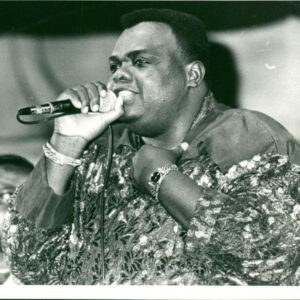
Also born in Kinshasa on November 30, 1951, Kabaselé Yampanya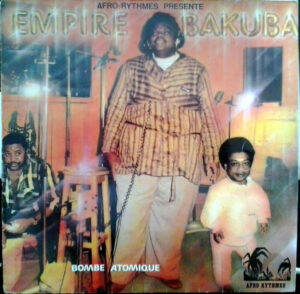 began his musical career in Le Grand Kallé’s African Jazz. He adopts the pseudonym Pépé Kallé because he considers Le Grand Kallé to be his musical mentor.
began his musical career in Le Grand Kallé’s African Jazz. He adopts the pseudonym Pépé Kallé because he considers Le Grand Kallé to be his musical mentor.
Since 1970, Le Grand Kallé had not recorded any music. On February 11, 1983, he passed away after a prolonged illness caused by chronic high blood pressure.
Le Grand Kallé’s life also had political aspects. These will be addressed in a future broadcast.
With thanks to Muziekweb in Rotterdam.
![]()
And to Harm van der Wal, for providing his African CDs.
Playlist:
- African Jazz: Mama Ngai Habanera, auteur: Joseph Kabaselé, 1962, Surboum African Jazz AJ 85 / CD Le Grand Kallé – His Life, His Music, 2013, Stern’s Music STCD3058-59, 2’55
- African Jazz: African Jazz, auteur: Joseph Kabaselé, 1954, Opika / CD Le Grand Kallé – His Life, His Music, 2013, Stern’s Music STCD3058-59, 2’53
- African Jazz: Naweli Boboto, auteur: Victor Longomba, 1960, Editions African Jazz / CD Le Grand Kallé – His Life, His Music, 2013, Stern’s Music STCD3058-59, 3’06
- African Jazz: Baila, auteur: Jean-Serge Essous, 1957, Esengo / Le Grand Kallé – His Life, His Music, 2013, Stern’s Music STCD3058-59, 2’35
- African Jazz: Tembe Nye, auteur: Joseph Kabaselé, 1958, Esengo / CD Le Grand Kallé – His Life, His Music, 2013, Stern’s Music STCD3058-59, 2’48
- Orchestre Bantous Jazz: Oguy na fort rousset, auteur: Jean-Serge Essous, CD Bantous zembe zembe: compilation musique Congolaise 1962-1973, 1998, Sonodisc CD 36591, 3’24
- African Jazz: Mokonzi Ya Mboka, auteur: Nicolas Kasanda, 1958, Esengo / CD Le Grand Kallé – His Life, His Music, 2013, Stern’s Music STCD3058-59, 2’44
- African Jazz: Butsana Mama, auteur: Joseph Kabaselé, 1967, Editions African Jazz / CD Le Grand Kallé – His Life, His Music, 2013, Stern’s Music STCD3058-59, 2’40
- African Jazz: Ko Ko Ko…Qui Est La?, auteur: Kwamy Munsi, 1970, Decca / CD Le Grand Kallé – His Life, His Music, 2013, Stern’s Music STCD3058-59, 3’28
- African Jazz: Nabongisa Kala, auteur: Tabou Rochereau, 1962, Single Surboum African Jazz A. J. 131 / CD Le Grand Kallé – His Life, His Music, 2013, Stern’s Music STCD3058-59, 2’49
- African Jazz: Matanga Ya Mobido, auteur: Joseph Kabaselé, 1962, Single Surboum African Jazz AJ 110 / CD Le Grand Kallé – His Life, His Music, 2013, Stern’s Music STCD3058-59, 2’54
- African Jazz: Makwela Ya Bana Mboka, auteur: Jeannot Bombenga, 1966, Single ASL 7-1839 / CD Le Grand Kallé – His Life, His Music, 2013, Stern’s Music STCD3058-59, 3’21
- African Jazz: Moselebende To Bolingo, auteur: Joseph Kabaselé, 1966, Single African Jazz A.J. 43 / CD Le Grand Kallé – His Life, His Music, 2013, Stern’s Music STCD3058-59, 5’04
- Empire Bakuba: Bombe Atomique, auteur: Pépé Kallé, CD Bombe Atomique, 1985, Sacodis 79512-2, 7’19
- Orchestre Empire Bakuba: Perfusion, auteur: Misha M’fum, CD Bitoto Johnny – Phenomenal Vol.1, 1986, Solfège Universel S.U.1956, 7’38








